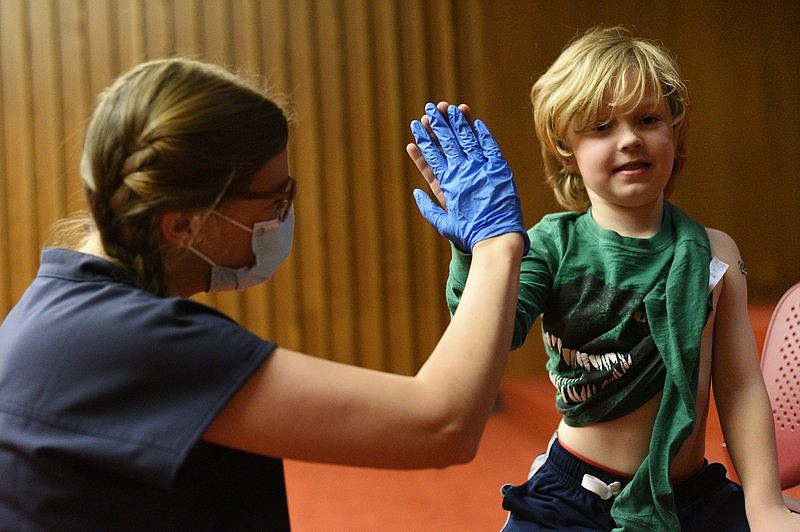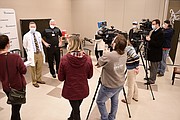COVID-19 vaccines were called "liquid gold" when the first shipment arrived in Chattanooga a year ago.
Each of Hamilton County's three hospitals received a box filled with 975 doses of the Pfizer vaccine the morning of Dec. 17. Front-line staff members who for nine months had witnessed the ravages of the coronavirus eagerly lined up to get their first jab. Some said they were overcome with emotions like happiness, relief and hope.
Due to their high-risk jobs and essential role in combatting the pandemic, health care workers were the first Tennesseeans eligible for vaccination. Many of them had already been infected by the novel virus.
Other health care workers lost colleagues or loved ones or were killed themselves by COVID-19 before the life-saving vaccines became available.
"There are millions of dead and dying that aren't going to have this opportunity that I've been afforded today," CHI Memorial hospitalist Dr. Lee Hamilton told a group of reporters who came to document the historic event, calling it "very humbling" to be one of the first in the region to receive one of the extremely limited doses.
(READ MORE: Chattanooga health care workers among first Tennesseans vaccinated against COVID-19)
Over the course of the year, vaccine supplies and access improved dramatically. More than 463,000 shots would be administered in the county, providing protection to more than 195,355 residents, or 53% of the population. Now any American age 5 and up can get what leading scientists say are the best COVID-19 vaccines in the world, and there are hundreds of opportunities to find free shots across the region.
But the task is far from over for those working to help vaccinate residents in the Chattanooga region.
"Our numbers are still not where they need to be," said Mary Lambert, director of community health for the city of Chattanooga. "It's 70% or more that we're looking for to better protect the entire population and reduce the likelihood of further variants developing. The transmission of infections is what really supports variants developing, like omicron now."
Scarce vaccine supply was the biggest challenge in the early days of the vaccination campaign. Shots were saved for those at highest risk, and top priority for the few providers administering doses was not to waste a drop.
Hamilton County Health Department Administrator Sabrina Novak, who at the time of the COVID-19 vaccine's arrival served as the department's emergency response coordinator, said it was an exciting and overwhelming time.
The months leading up to the first vaccine shipments were spent planning so that shots could start going into arms moments after they arrived, she said. Mass vaccination efforts were not new for the department, but now staff would need to oversee distribution of a highly-sought-after vaccine with special storage and handling requirements, on top of testing, contact tracing and other services.
"It's a balancing act, and it's a magnitude of something that I had never seen in my career," Novak said. "Pretty much any department was asked if they had staff that could come out and help us do this, because it was literally an all-hands-on-deck effort."
At peak demand, there were 150 to 175 people staffing the health department's three vaccination sites, Novak said. That figure doesn't include the administrative side.
Despite a state vaccination plan that was applauded for its efforts to prioritize equitable distribution, as with other aspects of health care, some of those who needed the life-saving drugs the most were left behind.
Many older adults waited in long lines for hours only to be turned away as supplies ran out. Others struggled to access vaccinations due to barriers such as transportation, communication challenges or issues with online scheduling platforms.
Dwayne Marshall, a leader at the Community Foundation of Greater Chattanooga who helped coordinate the Get Vaccinated Chattanooga Coalition, said that similar to when COVID-19 testing was limited in the early days of the pandemic, it was a challenge for people in Chattanooga's most vulnerable communities to navigate the system or get to the sites.
"There is still a need for us to better plan from the very beginning to ensure that those communities that are often least served and often have limited access are given priority in terms of getting access to information and the actual service needed to protect themselves and their families," Marshall said.
As members of each newly eligible group rushed to get vaccinated once it was their turn, the Get Vaccinated Chattanooga team worked to plan "pop-up" events that brought vaccines to underserved neighborhoods, which were also hit hardest by COVID-19 due to their limited access to health care services and higher rates of chronic conditions that put people at higher risk for serious infections.
Marshall said longtime local health care advocate Chris Ramsey, who died due to COVID-19 in January, was a major inspiration for the effort.
"A lot of the vaccination activity was largely due to his sacrifice and his legacy. He had been a stalwart in this community, especially around health in underserved minority communities, for the betterment of over 20 years," Marshall said.
By May, demand for COVID-19 vaccines had plummeted, and public health officials faced a new and bigger challenge - vaccine hesitancy.
"The tremendous levels of historical distrust around sometimes local, state and federal government made people very resistant to getting vaccinated," Marshall said.
Novak said that partnering with trusted sources, such as neighborhood and faith leaders, has been key to getting more people who are hesitant to decide to get vaccinated.
"We like to think that the health department is a trusted source, but there are many other trusted sources out there that we partner with to kind of dive into pockets of individuals that do have that hesitancy and to spread the education and the messaging," Novak said, adding the vast amount of misinformation online further complicates the effort.
(READ MORE: 'Get Vaccinated Chattanooga' coalition hopes to increase COVID-19 vaccine acceptance)
Even though vaccine hesitancy was anticipated, Marshall said he was surprised by how intense it's been and he thought access issues would be the biggest hurdle to overcome.
"What experience in our activity and events and outreach has taught me, that albeit increased accessibility has made a huge difference, that accessibility still has to be partnered with consistent communication, trust building, meeting people where they are - not only geographically but also awareness wise," Marshall said.
Lambert, whose long career in public health includes work at the U.S. Food and Drug Administration, said she had not anticipated how many questions people would have about the regulatory process and emergency use authorization - which some people have mistakenly interpreted as meaning the vaccines were not thoroughly tested or are still experimental.
In the future, she said public health communicators and the medical community need to do a better job explaining how a drug made available under emergency use authorization is still safe, even though it has not yet achieved full FDA approval. The general public's lack of understanding about drug approval "underpins a lot of the hesitancy and misinformation about the vaccines even now that they are fully approved," she said.
"I had to overcome my background, because I was familiar with the process. I was involved with the process. I was a regulatory affairs officer at the FDA, first at the center for drugs and then at the center for vaccines," Lambert said. "Going forward, we need to provide more information, so that there really is an understanding and a comfort with how rigorous the system is for protecting us."
Vaccines remain the best tool for saving lives and ultimately ending the pandemic. Though many more providers are also administering shots, Novak said the health department will continue to provide COVID-19 vaccination services as long as there's a need.
Demand has fallen but continues to fluctuate. With the need for boosters and younger age groups now eligible, the department is averaging about 300 shots a day at its various sites.
Going into the holidays, Novak said the effects of the pandemic weigh heavy on health department staff, especially those who track cases and report each COVID-19 death. They know that many of the deaths occurring now could be prevented if more people got vaccinated.
"We think about the folks that have that empty seat around that table because of COVID-19, and I think that that will stay with us our entire lives," she said. "Because it's not just numbers. Ultimately, for the people that are analyzing this, they're people. They're individuals."
Contact Elizabeth Fite at efite@timesfreepress.com or follow her on Twitter @ecfite.

